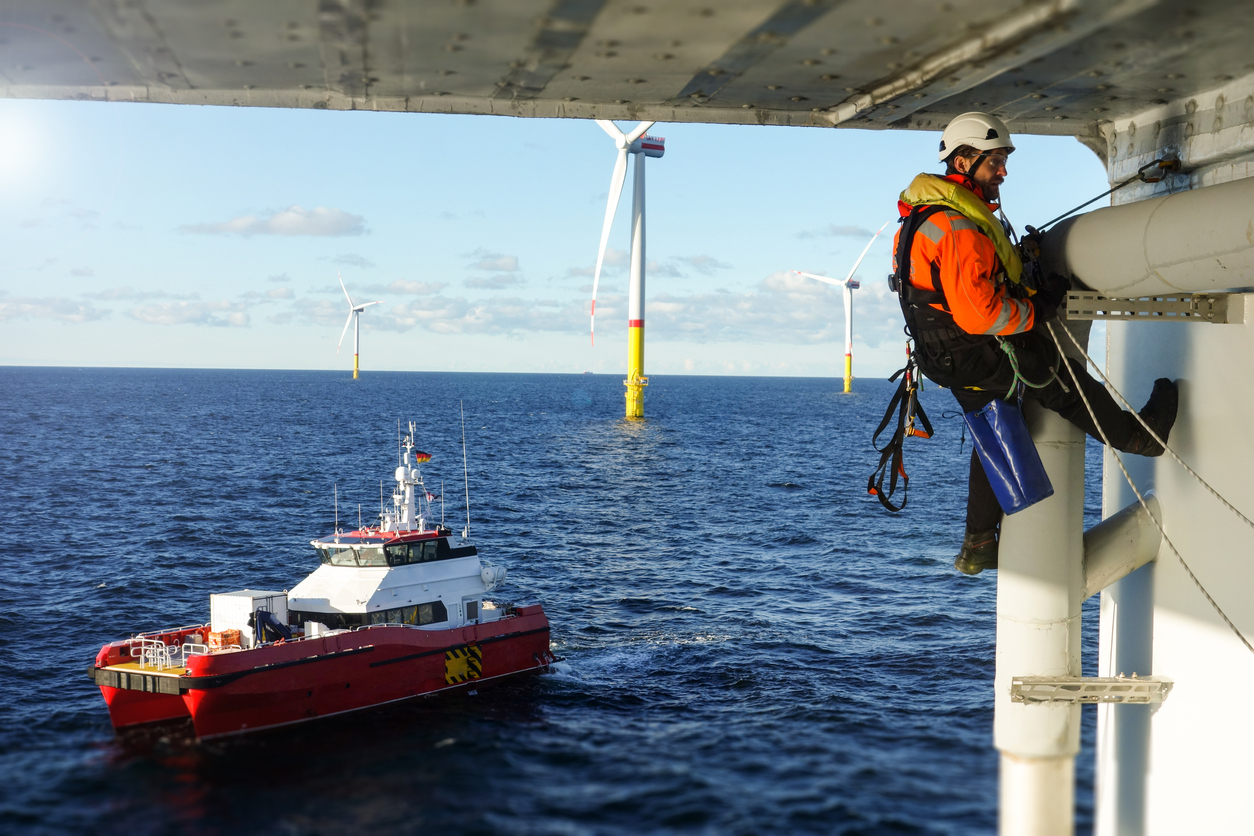
The Maryland Energy Administration (MEA) is excited to announce the Maryland Offshore Wind Workforce Training and Education Program (the Program) for Fiscal Year 2024. The Program provides grant funding on a competitive basis to support new or existing workforce training centers and academic institutions to expand their capabilities to support the State’s offshore wind workforce training and education efforts.
Applications will be accepted until March 1, 2024 at 5:00 PM EST. This Program offers both competitive and noncompetitive funding opportunities.
Proposed projects must provide general offshore wind education or training for employment within the offshore wind industry in Maryland and the larger U.S. offshore wind market and related industries, including but not limited to technical trade skills and/or safety standards.
MEA will consider applications for new or existing workforce training centers owned and/or operated by emerging businesses, including minority-owned emerging businesses, nonprofit organizations, governmental entities, and academic institutions that are expanding their course offerings and educational opportunities for the offshore wind industry.
MEA understands there are environmental impacts and climate risks that disproportionately impact historically disenfranchised groups and strongly encourages members of these groups to apply to the program.
Applicants that received grant funding from this Program in a previous fiscal year may receive additional grant funding from the FY 2024 Program.
Eligible Applicants: The Program is open to new or existing workforce training centers owned and/or operated by emerging businesses, including minority-owned emerging businesses, nonprofit organizations, governmental entities, and academic institutions.
Applicants that are business/corporate entities eligible to apply under the Maryland Offshore Wind Workforce and Education Program must fit within the definition of an “Emerging Business.” For purposes of this program, an “Emerging Business” is defined, pursuant to Md. Code Ann., State Gov't § 9-20C-01(e), as “a business that is at least 51 percent owned and controlled by an individual or individuals who are certified to have a personal net worth, as defined in §14-301 of the State Finance and Procurement Article, that does not exceed $6,500,000 as adjusted each year for inflation according to the Consumer Price Index.”
Applicants that are corporate/business entities that do not meet the Emerging Business definition are not eligible to receive grant funding from the Program.
Eligible Activities: Activities eligible for funding under the Maryland Offshore Wind Workforce and Education Program are specific to each AOI and are listed in each AOI’s respective FOA at the end of this Program Overview Document.
Funding: A total of up to $2,000,000 is anticipated to be available, split between each AOI, explained in the following table. MEA at its discretion may reallocate funding between AOIs based upon demand, quality of applications, and availability. Each AOI includes additional funding restrictions and are explained in each AOI’s respective FOA.
Area of Interest | Funding Availability |
Industry Education
| $ 500,000 |
Workforce Training
| $ 1,000,000 |
Internships
| $ 500,000 |
Minimum Eligibility Criteria: Minimum Eligibility Criteria are specific to each AOI and are explained in each AOI’s respective FOA.
Evaluation Criteria: Evaluation Criteria are specific to each AOI and are explained in each AOI’s respective FOA.
Application Documents: Documents required to complete an application package are specific to each AOI, and information on how to prepare an application can be found in each AOI’s respective FOA.
Grant Program General Provisions: MEA grant programs are covered by general requirements that will be made part of the grant agreement between MEA and a grantee. A copy of the General Provisions document is available on MEA’s
website; this document will be incorporated into all MEA Fiscal Year 2024 grant agreements.
Submission Instructions: The Program utilizes an online application portal, Jotform, that all applicants are required to use when submitting grant applications. The online application portal is accessible through MEA’s website. MEA will not consider administratively incomplete applications. Applications must include all of the materials provided within “Application and Required Documents” detailed in each AOI’s respective FOA.
Interested applicants may submit questions, comments, concerns and/or suggestions to the following MEA staff members:
Primary Alternate
Emma Stoney Samuel Beirne
Energy Program Manager Energy Program Manager
Wind and Water Program Wind and Water Program
Maryland Energy Administration Maryland Energy Administration
410-382-1605 410-537-4000

